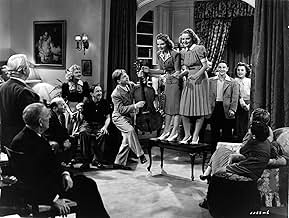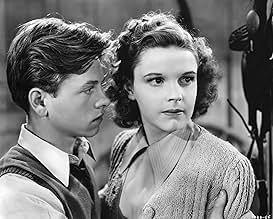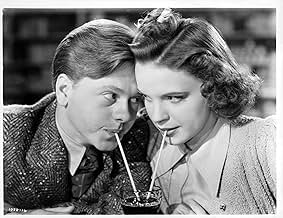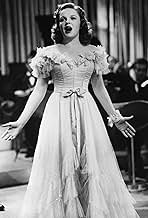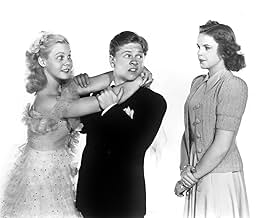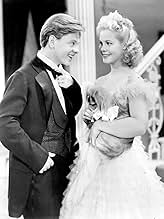Füge eine Handlung in deiner Sprache hinzuA group of vaudevillians struggling to compete with talkies hits the road hoping for a comeback. Frustrated to be left behind, all of their kids put on a show themselves to raise money for t... Alles lesenA group of vaudevillians struggling to compete with talkies hits the road hoping for a comeback. Frustrated to be left behind, all of their kids put on a show themselves to raise money for the families and to prove they've got talent, too.A group of vaudevillians struggling to compete with talkies hits the road hoping for a comeback. Frustrated to be left behind, all of their kids put on a show themselves to raise money for the families and to prove they've got talent, too.
- Für 2 Oscars nominiert
- 2 Gewinne & 2 Nominierungen insgesamt
- Bobs
- (as John Sheffield)
Empfohlene Bewertungen
P.S. Judy has a really cool dress in the finale.
What he and Judy do, they do better than anyone else, put on a show. In fact in this case the 'put on a show' gambit did originate in the original Broadway Musical. Babes in Arms was one of Richard Rodgers and Lorenz Hart's best shows it ran for 289 performances in the 1937 season and boasted such Rodgers&Hart classics as Johnny One Note, Way Out West, My Funny Valentine, I Wish I Were in Love Again all of which were discarded for the film. The Lady is a Tramp is only heard instrumentally, my guess is the Code frowned on that lyric. The title song and Where or When are retained. In fact when you come right down to it, only the basic idea the songs mentioned and a couple characters names came over from Broadway.
Still Nacio Herb Brown and Arthur Freed wrote Good Morning which is better known from Singin' in the Rain, but it was Judy and Mickey who introduced it here. And a whole lot of other Brown&Freed songs from MGM musicals got interpolated into the score.
Douglas MacPhail and Betty Jaynes who were introduced in Sweethearts also are here and sing beautifully. They married, but the marriage and MacPhail's career fell apart and he committed suicide a few years later. He had a great baritone voice, what a shame. The following year he introduced my favorite Cole Porter song, I Concentrate On You in The Broadway Melody of 1940.
This was the film Judy Garland did right after The Wizard of Oz and coming along right with her is Margaret Hamilton playing another Miss Gulch like character. One of those spinster ladies who forever pry into other people's business.
Believe it or not there was still a lot of prejudice against theatrical people even in 1937. A lot of old vaudeville types like Charles Winninger, Rooney's father in the film, settle in the town of Seaport on Long Island and their presence apparently upsets the ruling families like Hamilton's. When times go bad and vaudeville goes to seed, things get kind of rough for them. The old timers try to take a last tour to raise some money, but instead it's the kids who are up to the latest trends in pop music who save the day.
Guy Kibbee is in this also, playing against type as a wise and sympathetic judge, usually the parts MGM reserved for Lewis Stone or Lionel Barrymore. A more typical Kibbee type would be the oafish tycoon in 42nd Street, but he's fine here.
Possibly director Busby Berkeley wanted Kibbee, maybe as a good luck charm from that other breakthrough musical of his from his days at Warner Brothers. Of course the musical numbers in the show are set with the usual Berkeley surrealism, a little tempered though from his high flying days at Warner Brothers. That same year Berkeley had done a surreal type number in the Jeanette MacDonald-Lew Ayres film Broadway Serenade and it laid an egg. Someone at MGM must have reined him in.
Babes In Arms retains all its charms from 1939 mainly because Mickey Rooney is infectious and Judy Garland's singing is eternal.
"Babes in Arms" was a Broadway musical by Lorenz Hart and Richard Rodgers. Like most of those movies of that time, the creative people in the studio took liberties, incorporating material that was not in the original theater work. Busby Berkeley, the genius of those musical films, was at the helm. It's easy to see his imprint all over the movie in the way he stages the big musical numbers and move his players to get a maximum result out of them.
Mickey Rooney and Judy Garland were two young actors at the time that were good in whatever they did together. The pair showed an amazing amount of charisma in their musical numbers as well as in the over all chemistry in all their scenes together. Mickey Rooney plays the earnest Mickey Moran, the son of vaudevillians, who wants to make a name for himself. Judy Garland is Patsy Barton, a girl-next-door type that is sweet, wise and patient, even when Mickey is dazzled by the film star that wants to back their show in order to have the lead in it.
The other players are excellent, which is not saying much, as MGM and the other studios were blessed with solid talent that went from film to film doing amazing work in whatever picture they appeared. Charles Winninger, Guy Kibee, Betty Jaynes, Douglas McPhail, and the wonderful Margaret Hamilton appear in supporting roles.
Enjoy the infectious actors of this movie and the Rodgers and Hart music, as well as the other songs that were added to it. Busby Berkeley did a marvelous job with the film that shows a less stressful time in the country.
On the other hand, is it really possible that the manic Mickey Rooney was only 19 when he made this? He really shows why he may be the single most talented American performer of the last century. He dances, he sings, he does drama, he does comedy, and he has incredible control over his every move and muscle. And he does unbelievable and hilarious impressions of Clark Gable and Lionel Barrymore. And Franklin Roosevelt.
A few quick notes: June Priesser, who plays "Baby" Rosalie, was a terrible actress. But watch out for her stomach-churning contortionist back-rolls when she first comes out on a stage.
The child actor who plays Mickey Rooney at age 5 dancing on a Vaudeville stage for a few moments early on really does look like Mickey Rooney!
I think Judy Garland actually has some of the same lines in this movie as she does in "Wizard of Oz", done in this same year. Watch out for when Mickey Rooney feints early in the film; Garland reacts to this exactly, and I mean exactly, as she does in Oz when the Lion feints. Eerie!
When Judy Garland, as Eleanor Roosevelt, sings "My day, my day", she is referring to an actual long-running newspaper column written by E.R. from 1936 to 1962.
Finally, the final song and dance number is the most mind-numbing, over-the-top tribute to America, dancing, how we are not Nazis, American Indians, Asian Indians, dancing, the Roosevelts, and dancing, that I have ever seen. Yes, it was early WWII, but still, you wonder if anyone even in 1939 thought this was a little too much?
Recommended for its high energy, its Rooney and Garland, its more Rooney, its offensiveness, and its too much of everything. It is history, and should be watched by all.
Wusstest du schon
- WissenswertesMGM Studio's biggest money grosser of 1939, surpassing Das zauberhafte Land (1939) for that production year.
- PatzerDuring the girls' duet, Patsy Barton begins her solo, and Mickey Moran switches from cello plucking to piano thumping. However, the music continues as it was before, and we don't hear any amazing sounds on the piano in spite of Mickey's efforts.
- Zitate
Rosalie Essex: How much do you need?
Mickey Moran: Well, let me see. First of all, we're going to use a barn that some actors used last summer and turned it into an outdoor theater. I figured if we all pitched in together - that is, for the scenery and the costumes and everything - it would run us about $287.
Rosalie Essex: Have you got it yet?
Mickey Moran: No.
Rosalie Essex: Well, you have now.
- Alternative VersionenOlder TV prints (and early video releases) of "Babes In Arms" run 91 minutes, and exclude the "My Day" segment of the finale, with Mickey Rooney and Judy Garland spoofing Franklin and Eleanor Roosevelt. This segment was deleted for a 1948 reissue. "My Day" was restored in the 1990's by Ted Turner, and is included in current prints.
- VerbindungenEdited into Hollywood: The Dream Factory (1972)
- SoundtracksBabes in Arms
(1937)
Music by Richard Rodgers
Lyrics by Lorenz Hart
Played during the opening credits
Sung by Douglas McPhail (uncredited), Mickey Rooney (uncredited), Judy Garland (uncredited) and chorus
Top-Auswahl
- How long is Babes in Arms?Powered by Alexa
Details
- Erscheinungsdatum
- Herkunftsland
- Sprache
- Auch bekannt als
- Los hijos de la farándula
- Drehorte
- Produktionsfirma
- Weitere beteiligte Unternehmen bei IMDbPro anzeigen
Box Office
- Budget
- 748.000 $ (geschätzt)
- Laufzeit1 Stunde 34 Minuten
- Farbe
- Seitenverhältnis
- 1.37 : 1
Zu dieser Seite beitragen



